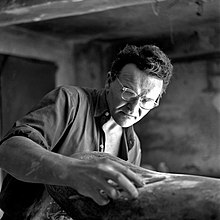Vojin Bakic
Vojin Bakić (born June 5, 1915 in Bjelovar , Austria-Hungary , † 1992 in Zagreb ) was a Yugoslav sculptor . He was an important exponent of abstract sculpture and art after World War II . His work was instrumental in the transition in Yugoslav sculpture from socialist classicism to socialist modernism.
Life
Bakić was born in Bjelovar in 1915 to a wealthy family. His father was Konstantin Bakić (* 1882 in Bjelovar, † 1925 in Sušak ), he was of Serbian origin. His mother was Jelena born. Schnautz (* 1889 in Bakar ; † 1970). She came from a wealthy family, her father was of Swedish origin and her mother came from a Hungarian-Slovak aristocratic family.
Bakić attended elementary school from 1921-32 and then the high school in Bjelovar. In 1933 he exhibited works of his own for the first time. Bakić first studied law, but he dropped out. He switched to studying art at the Academy in Zagreb with Frano Kršinić and graduated with a diploma in 1939. In the same year he took part in the exhibition “Zagreb Artists” in Zagreb . 1940-41 he took lessons from Frano Kršinić, Roberta Frangeša-Mihanovića and Ivan Meštrović . Bakić went on a trip to Italy and visited Florence and Milan.
During World War II, he and his four brothers were arrested by the Ustaša because they were Serbs . His four brothers died in the Jadovno concentration camp . Bakić survived because of a letter from his former teacher Frano Kršinić to the government requesting his release. In 1942 he married Ljubo Schneider with whom he had a child, Zoran († 1992).
Bakić began his artistic work with sculptures in the style of socialist realism, but turned more and more to elementary geometric forms. A well-known work of this time is the sculpture "Taurus".
In 1956 he was a participant in the Venice Biennale and documenta 2 in 1959 in Kassel .
In the 1960s to 1970s he created various monumental sculptures in Yugoslavia dedicated to aspects of the Second World War. Many of these monuments have been destroyed or abandoned since the 1990s and are at risk of looting and vandalism.
Awards
- 1979: Vladimir Nazor Prize for Applied Arts
Gallery of works (selection)
Monument to the victory of the inhabitants of Slavonia (1957–68) Location: Kamenska , Blažuj mountain (blown up in 1992)
Dotrščina Memorial Park - main monument (1963–68) Location: Zagreb
Monument to the uprising of the inhabitants of Kordun and Banija (1971–81) Location: Petrova Gora National Park near Vojnić (status 2010)
Circles in the Šumarice Memorial Park (Memorial to the Kragujevac Massacre ) (1981) Location: Kragujevac
Web links
- Materials by and about Vojin Bakic in the documenta archive
- Bakić exhibition catalog
- Vojin Bakić in the Spomenik Database
Individual evidence
| personal data | |
|---|---|
| SURNAME | Bakić, Vojin |
| BRIEF DESCRIPTION | Yugoslav sculptor |
| DATE OF BIRTH | June 5, 1915 |
| PLACE OF BIRTH | Bjelovar |
| DATE OF DEATH | 1992 |
| Place of death | Zagreb |






